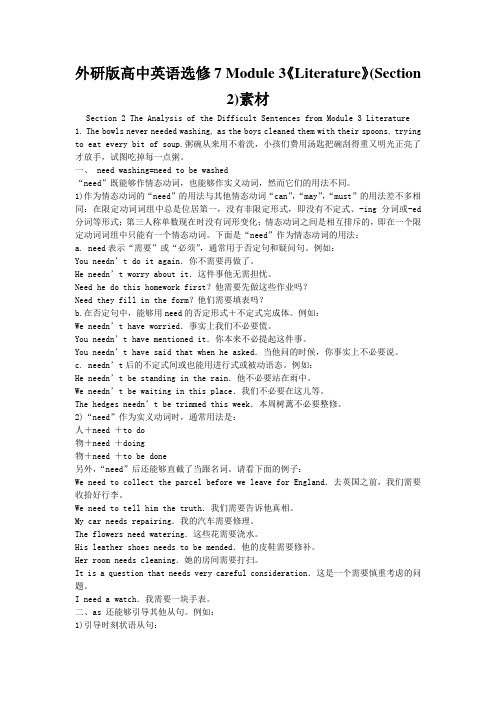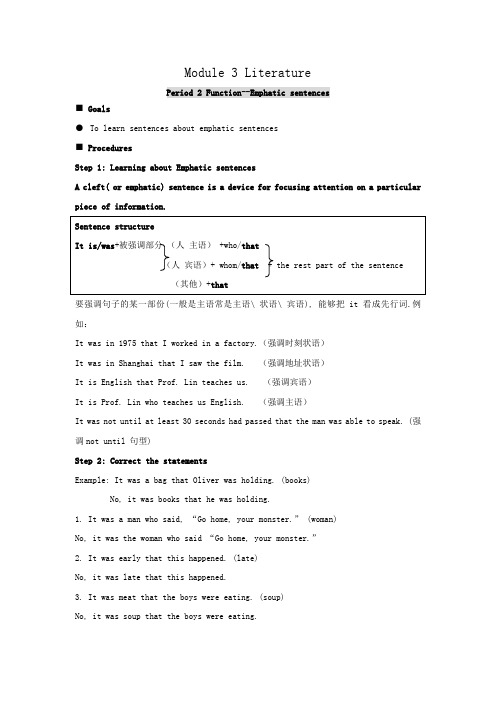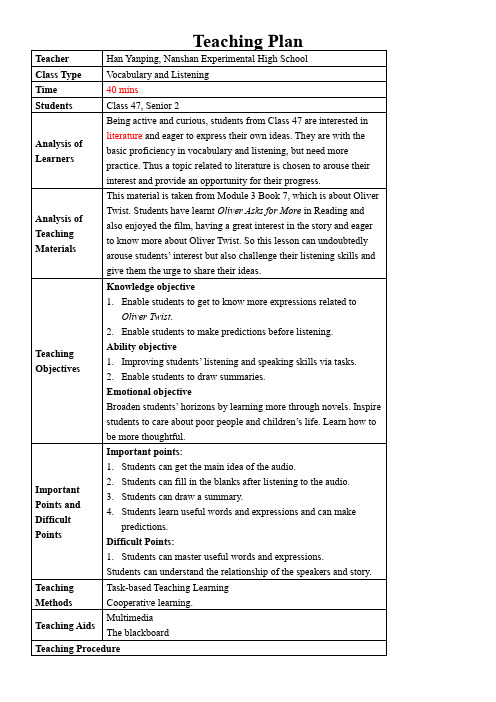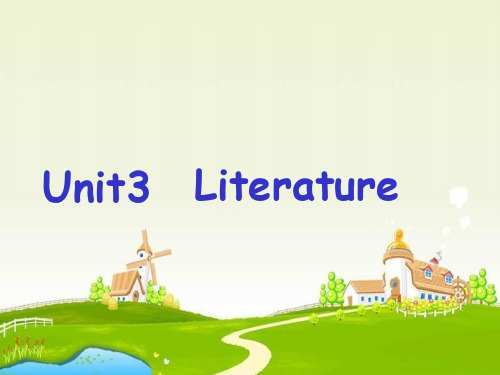外研版高中英语选修七黑龙江省大庆市林甸一中Module3LiteraturePeriod2导学案
外研版高中英语选修7 Module 3《Literature》(Section 2)素材

外研版高中英语选修7 Module 3《Literature》(Section2)素材Section 2 The Analysis of the Difficult Sentences from Module 3 Literature 1. The bowls never needed washing, as the boys cleaned them with their spoons, trying to eat every bit of soup.粥碗从来用不着洗,小孩们费用汤匙把碗刮得重又明光正亮了才放手,试图吃掉每一点粥。
一、 need washing=need to be washed“need”既能够作情态动词,也能够作实义动词,然而它们的用法不同。
1)作为情态动词的“need”的用法与其他情态动词“can”,“may”,“must”的用法差不多相同:在限定动词词组中总是位居第一,没有非限定形式,即没有不定式、-ing分词或-ed 分词等形式;第三人称单数现在时没有词形变化;情态动词之间是相互排斥的,即在一个限定动词词组中只能有一个情态动词。
下面是“need”作为情态动词的用法:a. need表示“需要”或“必须”,通常用于否定句和疑问句。
例如:You needn’t do it again.你不需要再做了。
He needn’t worry about it.这件事他无需担忧。
Need he do this homework first?他需要先做这些作业吗?Need they fill in the form?他们需要填表吗?b.在否定句中,能够用need的否定形式+不定式完成体。
例如:We needn’t have worried.事实上我们不必要慌。
You needn’t have mentioned it.你本来不必提起这件事。
You needn’t have said that when he asked.当他问的时候,你事实上不必要说。
外研版高中英语选修7module 3 literatureperiod 2word

Module 3 LiteraturePeriod 2 Function--Emphatic sentences■ Goals●To learn sentences about emphatic sentences■ProceduresStep 1: Learning about Emphatic sentencesA cleft( or emphatic) sentence is a device for focusing attention on a particular piece of information.要强调句子的某一部份(一般是主语常是主语\ 状语\ 宾语), 能够把it 看成先行词.例如:It was in 1975 that I worked in a factory.(强调时刻状语)It was in Shanghai that I saw the film. (强调地址状语)It is English that Prof. Lin teaches us. (强调宾语)It is Prof. Lin who teaches us English. (强调主语)It was not until at least 30 seconds had passed that the man was able to speak. (强调not until 句型)Step 2: Correct the statementsExample: It was a bag that Oliver was holding. (books)No, it was books that he was holding.1. It was a man who said, “Go home, your monster.” (woman)No, it was the woman who said “Go home, your monster.”2. It was early that this happened. (late)No, it was late that this happened.3. It was meat that the boys were eating. (soup)No, it was soup that the boys were eating.4. It was Mr. Bumble who gave the boys their food. (the warden)No, it was the warden who gave the boys their food.5. It was Mr. Bumble who was locked in a room. (Oliver)No, it was Oliver who was locked in a room.Example: Did Oliver want more clothes? (food)No, what Oliver wanted is more food.1. Did Charles Dickens write novels about modern London? (Victorian London) No, what Charles Dickens wrote was novels about Victorian London.2. Did Nancy pretend to be Oliver’s mother? (sister)No, what Nancy did was to pretend to be Oliver’s sister.3. Did Nancy terrify Oliver? (the man)No, what terrified Oliver was the man.4. Did Oliver go with the man? (shout for help)No, what Oliver did was shouting for help.。
高中英语外研版高中选修7Module3Literature-教学设计

1.Improving students’listening and speaking skills via tasks.
2.Enable students todraw summaries.
Emotional objective
Broaden students’horizons by learning more through novels. Inspire students to care about poor people and children’s life. Learn how to be more thoughtful.
2.To arouse students’curiosity towards the listening materials
Step 2:
Pre-listening
1.Learn and review some words:
2.Give students four sentences and ask them to make predictions about what’s happening.
Students can understand the relationship of the speakerk-based Teaching Learning
Cooperative learning.
Teaching Aids
Multimedia
3.Students can draw a summary.
4.Students learn useful words and expressions andcanmake predictions.
Difficult Points:
高中英语外研版选修七Module 3

Module 3 LiteratureI.教学内容分析本模块以Literature为话题,介绍了著名英国古典文学作家查尔斯•狄更斯(Charles Dickens)的生平和他的作品《雾都孤儿》(Oliver Twist)、《远大前程》(Great Expectations)的片段,旨在通过这样的话题,使学生运用所学的知识谈论小说中的人物及其情节,更多地了解作家的作品及其作品的时代背景和深刻的社会意义。
通过学习能将小说中的精彩片段表演出来,让学生了解如何对人物和事件进行描写。
通过本模块学习,学生要对小说与文学有个辩证认识,学会鉴赏文学的魅力。
Introduction 通过电影Oliver Twist的一幅剧照介绍了著名作家查尔斯•狄更斯(Charles Dickens)。
并设计相关的问题对剧照中的人物和故事发展进行预测,在一定的练习中了解和熟悉所涉及到的词汇和短语,让学生进一步熟悉这些词汇,为本模块的学习奠定基础。
Reading and Vocabulary (1) 部分通过阅读《雾都孤儿》中的一段标题为“Oliver Asks for More”片段,设计了以下的任务:1. 学会对素材片段进行概括,培养学生的总结能力和对文章中心的把握能力;2. 学习相关的词汇和短语,为进一步理解课文扫清障碍,培养学生学习生词的能力,解决了方法问题,同时设计一定的练习,巩固所学习的词汇;3. 在词汇学习的基础上,通过完成素材中的句子填写练习,完成从词到句的功能转变,让学生不仅能学习词汇,而且能更好地巩固一定固定意义的句子结构。
Grammar (1) 部分通过观察课文中的例句,要求学生能够识别倒装句的基本形式,并能运用倒装表达强调意义。
Speaking (1) 部分是阅读文章后所展开的一项活动,要求学生能够模仿其内容和角色进行适当的角色扮演练习,并对人物进行评价。
Vocabulary and Listening部分为《雾都孤儿》的精彩片段,旨在听的基础上去理解这部小说,并完成四项任务:1. 提供一定的句子和词汇,扫清了听力中可能产生的障碍;2. 提供问题,预测听力内容和问题答案,引导听力任务的顺利进行;3. 听取一段精彩的片段,判断所预测的问题答案是否正确,然后回答问题;4. 要求听第二遍,完成信息获取。
外研版高中英语选修7 Module 3《Literature》

Grammar(1): Inversion Used for Emphasis
• 英语的正常语序是主语在前,谓语在后。但 有时为了语法的需要或为了强调,把全部谓 语或谓语的一部分提到主语前面,这种语序 在语法称为倒装。除了在疑问句中,句子要 用倒装外,还有一些句子要用倒装。英语的 倒装一般分成两种,一是把谓语动词全部放 在主语前,叫做全倒装。一是把谓语的助动 词部分放在主语前,叫做部分倒装。
•
部分倒装 – only所修饰的副词,介词短语和状语从句放 在句首时, 如: • 1) Only then did he know that he was rejected by the boss. • 2) Only in this way can you collect more stamps. • 3) Only when her father came back was she able to go to school.
一些含有否定意义的副词或连词 如hardly, never, not, not only, little,
c.用so作简单回答时表明前面说的情况也适 用于另一个人, 如: • He likes swimming in summer very much. So do I. • We saw the football match last week. So did they. • The girl can speak fluent English. So can the boy.
• • • •
•
• •
但如果主语是人称代词时,不用倒装,如: Here it is. Down it dropped. – 直接引语的部分或全部放在句首时,如: 1) “Who will come here to help you?” asked the teacher. 2) “I don’t think he will come.” said the girl. – 当介词短语在句首时,如: 1) In front of the old house sat an old woman. 2) On the top of the mountain stands a tower.
高中英语外研版 选修7 Module 3 Literature

文学核心词汇. ..$ .., ..?.(哀痛) ,..(分发) ..’(支撑) ..’(食欲) .., .().’ .();;高频短语.用这种方法.抓紧,握紧.刚一……就…….惊讶地,吃惊地.用……声音(说),……声地.挑选.大量的.使某人关注某事.喜欢……... ... . .重点句式.,, .粥碗从来用不着洗,孩子们非用汤匙把碗刮得明光铮亮了才住手,试图吃掉每一点粥。
.,, .他们这样把碗刮干净后,就坐在那儿,眼巴巴地瞅着汤锅,似乎要把它也吞进肚子里。
. .奥利弗·特威斯特被选中了。
., .至少过了三十秒钟,他才说出话来。
. .孩子的话刚出口,大师傅就操起勺子狠狠地敲他的脑袋。
.“!” .“我还从来没有听过这样的事情呢!”林勃金斯先生说道。
;;;;知识详解①.服务;服役;端上(饭菜),供应;满足……的需要;合乎(目的);接待(回归课本) ,, .开饭的时候,大师傅在锅边舀粥,有两个女人替他打杂。
【归纳总结】【例句探源】①, .作为党员,我们要全心全意为人民服务。
②, .毕业后,他回到希腊服军役。
③?有人接待您了吗?④(朗文) .这张旧的长沙发只好用作客人的床了。
⑤’ .二者不是一回事,并且用途也不同。
【即境活用】. ..;.;.;.;解析:选。
句意是:那家饭店从六点到九点提供晚餐。
长达二十年了,这种习惯一直没有改变。
第一个空用的被动语态形式,表示“(饭菜)被提供”。
第二个空用作系动词用,表示“保持”,作表语。
★ .....解析:选。
充当。
句意为“在这墓中发现的动物骨头,将作为科学研究的重要材料。
”②.报酬;奖励;赏金.酬劳;奖赏(回归课本) , .第二天早晨,济贫院大门外贴出了一张告示,向愿意雇用奥利弗的人提供奖赏。
【归纳总结】【例句探源】①’; .我不是为了报酬做这件事,只是由于爱好。
② .作为对所提供服务的奖赏,他得到了一枚奖章。
③$ .他因抓获罪犯而获得美元的酬金。
④, .如果他们达成目标,就要论功行赏,光是讲好话是不够的。
外研版高中英语选修七黑龙江省大庆市林甸一中Module3 Literature导学案
Knowledge and skills:Master the usage of the wordsProcess and methods:Read about the usage of the listed words and finished the exercisesEmotion and Values:Encourage students master the new words and use them freely Important and Difficult Points:To revise the important words and phrases Knowledge Links:How to change the basic knowledge into skillsLearning Guidance:Refer to the exercise book and cooperate with your partners一.完成下列短语并背诵。
1.______________吃惊地;经验地2.__________________ 用… 的嗓音说3.________________ 大量的4._____________________使某人关注某事5._____________盯着;注视6.___________________ 信任某人7._______________结果8.___________________在某人二十几岁时9.________________ 喜欢上10.__________________ 抓紧;不放手11.______________打算做某事12.__________________ 受…折磨13.________________ 缺乏14.__________________ 舒适自在15._________________放开16._________________ 刚一…就17.__________________有…爱好18.___________________ 好像…19.__________挑选,弄明白,区分,领会20.___________________ __ 小声说21be desperate for _______________ 22.hang about_____________________23.hang back _________________ 24.hang on _____________________25.hang up ____________________ 26.put up ________________________27.as a reward for _________________28.in reward of ____________________29.give /offer a reward to sb. for sth.________________________30.________________为某事报答某人31.__________________证明某人有…罪32.escape form __________________ 33.________________ ______九死一生34.intend sb. to do sth._______________35.be intended for________________36________________________关心37.be cruel to sb.__________________38.feed sb/sth with/on _______________ 39.____________________ 对…渴望40._______________ 抓住现在41.starve to death __________________42._______________ 堆起来43._______________ 支持44.be fed up with_______________ 45.It is cold for May. _______________二词汇训练,根据首字母和汉语意思填写单词。
外研版高中英语选修7 Module 3《Literature》单元测试
Module 3 Literature(时间:120分钟满分:150分)第一部分听力(共两节,满分30分)第一节(共5小题;每小题1、5分,满分7、5分)听下面5段对话.每段对话后有一个小题,从题中所给的A、B、C三个选项中选出最佳选项,并标在试卷的相应位置。
听完每段对话后,你都有10秒钟的时间来回答有关小题和阅读下一小题。
每段对话仅读一遍。
1.What can we know about the woman?A.She has just bought a mobile phone、B。
She finds it pretty easy to use the mobile phone、C。
She often forgets to turn on the mobile phone、2.Which of the following is the most probable reason why Bill lost his job?A.He was usually late for work、B。
He often made mistakes in his work and asked for leaves、C。
He made a serious mistake in business with a company、3.What do we know from the conversation?A.The man regretted inviting his wife's boss to the dinner party、B.The two speakers enjoyed themselves at the dinner party、C。
The boss of the man’s wife left the party earlier、4.How does the man feel about his interview?A。
高考英语外研版:选修7+Module+3+Literature
养 达
基
础 知
3.rough adj._多__暴__力__的__;__犯__罪__率__高__的__
标
识
梳 理
4.drag v._拖__;__拉__;__硬__拽____
课 时
重 难
5.prison n._监__狱__
考
提 能
点 探
6.wedding n._婚__礼__
练
究
返
首
页
课 前
7.illegally adv._违__法__地__;__非__法__地___
心 素
语
about the culture.
养 达
基
础 2.Whenever he is faced with difficulties in writing, he won't give
标
知
识
梳 up easily.
课
理
时
重 3.What makes this novel stand out is its unique characters, language, 提
核
三 言 两
心
1.After three days without food, the men were close to _s_ta_r_v_a_ti_o_n__. 素
语
养
基 础 知
If we had come later, they would have _st_a_r_v_ed__ to death.(starve) 2.The man in the river _d_e_s_p_er_a_t_el_y__ tried to reach the side.The
外研版高中英语选修七Module 3Literature教案2
Module 3 LiteratureThe first period (词汇教学)Teaching aims1.Train and develop students’ ability of solving problems(multiple choices)2.train and develop students’ ability of reading comprehension3.enable students’ to master the usages of the following 9 words: Scene; feed: Serveeager; appetite ;whisper; desperate; seize;hangTeaching procedures:Step 1. Check students’ homework1. Check the answers of daily exercise 59 and solve the difficult problems in groups ( Students’ activity 1)T: Have you done your daily exercises ?First let me check your answers . Then you can deal with your problems in your groups.2. Check the answers of reading material A in the newspaperStep 2 New words1.Scene1). (戏剧的)一场2). 场面;事件[C]3.) 景色,景象;(舞台)布景[C]What a fantastic mountain scene! 多么迷人的山景!4.) (事件发生的)地点,现场;(戏剧等的)背景[the S][(+of)]The criminal fled the scene.罪犯逃离了现场。
- 1、下载文档前请自行甄别文档内容的完整性,平台不提供额外的编辑、内容补充、找答案等附加服务。
- 2、"仅部分预览"的文档,不可在线预览部分如存在完整性等问题,可反馈申请退款(可完整预览的文档不适用该条件!)。
- 3、如文档侵犯您的权益,请联系客服反馈,我们会尽快为您处理(人工客服工作时间:9:00-18:30)。
外研版高中英语选修七黑龙江省大庆市林甸一中Module3LiteraturePeriod2导学案Period2 Reading and vocabulary ;Reading practice and Cultural corner Knowledge and skills:Develop students' reading ability.Process and methods:Individual work or pair work or group work to get every student to participate in class activities.Emotion and Values:Help the students to improve their reading ability.Difficult Points:Lead the students to talk in class actively.Learning Guidance:read the new words fluently and finish the task,referring to the dictionary.A. Read the passage on Pages 30-31 of S tudents’ Book 7 and fill in the blanks with proper words.The boys were 1______ in a large stone hall. At meal times, the warden, with the help of two women, 2______the soup from a large pot. Each boy was allowed only one bowl of soup. Boys usually have excellent 3______. Oliver and his companions slowly 4______ for three months, and finally they became 5______ with hunger. They decided one of them should ask for more soup and Oliver was 6______. One evening, after finishing his bowl of soup, Oliver rose from his table and walked up to the warden. 7______ by his own courage, he said, “Please sir, I want some more.” 8______ had Oliver finished his words than the warden hit him on the head with the soup spoon. At last Oliver was locked in a room and the next morning, a notice was put up on the door of the workhouse, offering a 9______ to anyone who would like to 10______ Oliver. B. Read th e passage on Page 39 of Students’Book 7 and fill in the blanks with proper words.At Charles Dickens’ time, London was the largest and richest city in the world. However, the wealth was 1______ unfairly among people. The East End was London’s poorest 2______, where people lived a hard life. Their 3______ was ignored by those 4______ and they could not hope to 5______ an acceptable standard of living. But on the other hand, some Londoners had 6______ a lot of money through trade. Banks and 7______ were housed in the Old City of London and there were many squares and gardens with water pumps and 8______. Rich families had servants and 9______ who served them. Dickens provided a social 10______ of London life in his novels.C. Cultural cornerRead the passage on Page 41 of Students’ Book 7 and make the best choices.1. This passage mainly talks about _____.A. Charles Dickens’ famous novelsB. Charles Dickens in generalC. Dickens’ efforts to improve the lives of the poorD. the reason why Dickens’ novels were popular2. Which of the followings is NOT true about Dickens according to the passage?A. He made a living at an early age.B. It was in his 30s that he began writing novels.C. His father was put in prison for debts.D. When Oliver Twist came out, he was in his thirties.3. What can be inferred from this passage?A. Great Expectations was one of his famous novels.B. Dickens was good at describing the life of the poor.C. The novelist was fond of travelling around.D. His novel drew attention of the public to child poverty.4. What does “it” in the last sentence of Paragraph 1 refer to?A. Poverty.B. Bills.C. Work.D. Prison.5. According to the last paragraph, we may learn that _____.A. Dickens died of heart attackB. Dickens went to America to give lecturesC. Dickens sometimes couldn’t control his feelings while readingD. Dickens’ novels were popular only in America and EnglandPeriod2A. 1. Fed 2. served 3. appetite 4. starved 5. wild / desperate6. Chosen7. Frightened8. No sooner9. reward 10. employ / hireB. 1. distributed 2. district 3. welfare 4. taxpayers 5. attain 6. accumulated7. corporations 8. fountains. 9. maids 10. commentary C 1-5 BDBACPeriod 3 language pointsKnowledge and skills: Get students to master the vocabulariesEmotion and Values: Help students to enjoy using wordsDifficult Points: Lead the students to talk in class activelyImportant Points: Help the students to improve their ability Learning Guidance: Read the new words fluently and finish the taskscene n. scenic adj.on the scene 在现场behind the scene 在幕后,秘密的,暗中(1) 场景场面The film contains violent scenes.译:___________________________________ (2) 事发地点The police soon arrived at the scene of the crime.译:_______________________ (3) 景色、景象、景致He photographed a wide range of street scenes.A delightful rural scene 译:_____________________________________2. Whisper n. 私语;谣传;飒飒的声音vi.耳语;密谈;飒飒地响vt. 低声说出whisper a word in my ear/ speak in a whisper/whispersdesperate v. 极需要(1) 绝望而不惜冒险的, 不顾一切的, 拼命的Time was running out and we were getting desperate.译:______________________ (2) desperate for / to do sth. 极需要他急需要找到一份工作。
